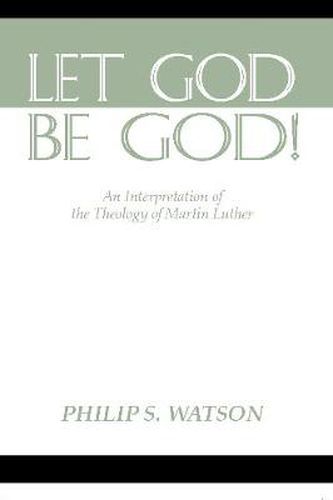Readings Newsletter
Become a Readings Member to make your shopping experience even easier.
Sign in or sign up for free!
You’re not far away from qualifying for FREE standard shipping within Australia
You’ve qualified for FREE standard shipping within Australia
The cart is loading…






How is it possible for God to be God, in a world where human beings find it quite natural to live and think as if they themselves stood at the center of things? Philip Watson, outstanding English Methodist, whose scholarly and objective research on Luther is contributing greatly to contemporary Protestant evaluation of the Reformer, finds his answer to the question in Luther’s Copernican Revolution. Copernicus challenged the old theory that the sun moves around the Earth. He said that the sun is the center of things and the earth moves around it. Similarly, Luther challenged the teaching, in effect, that mortals are at the center of things, and that everything moves around them. Not so. God is the center. Without Him, humanity is nothing. Human salvation lies not in things mortals do, but in what God does - through Christ. His point determines Watson’s theme, Let God Be God - that is, let humanity recognize God’s will and way. Significantly, this study of Luther by a non-Lutheran indicates the influence of Scandinavian sources in the study and research of Watson. In his Preface, the author acknowledges assistance from such Swedish scholars as Aulen, Nygren, Bring, and others. The first part of Let God Be God evaluates Luther as a theologian and points out the motif of his thought. The book proceeds to concentrate on three major themes in Luther: The Revelation of God, The Theology of the Cross, and The Doctrine of the Word. Philip Watson writes forcefully - with the zeal of one who has made a discovery that he feels must be shared with others. His simple literary expression makes clear some profound theological distinctions that are often difficult for the average reader to comprehend. Notes on each chapter contain numerous quotations from Luther. Those already acquainted with Luther will find this interpretation of his lectures, writings, and sermons particularly stimulating. Let God Be God is significant reading for the student and lay person who wants to know better the theology of the Reformer.
$9.00 standard shipping within Australia
FREE standard shipping within Australia for orders over $100.00
Express & International shipping calculated at checkout
How is it possible for God to be God, in a world where human beings find it quite natural to live and think as if they themselves stood at the center of things? Philip Watson, outstanding English Methodist, whose scholarly and objective research on Luther is contributing greatly to contemporary Protestant evaluation of the Reformer, finds his answer to the question in Luther’s Copernican Revolution. Copernicus challenged the old theory that the sun moves around the Earth. He said that the sun is the center of things and the earth moves around it. Similarly, Luther challenged the teaching, in effect, that mortals are at the center of things, and that everything moves around them. Not so. God is the center. Without Him, humanity is nothing. Human salvation lies not in things mortals do, but in what God does - through Christ. His point determines Watson’s theme, Let God Be God - that is, let humanity recognize God’s will and way. Significantly, this study of Luther by a non-Lutheran indicates the influence of Scandinavian sources in the study and research of Watson. In his Preface, the author acknowledges assistance from such Swedish scholars as Aulen, Nygren, Bring, and others. The first part of Let God Be God evaluates Luther as a theologian and points out the motif of his thought. The book proceeds to concentrate on three major themes in Luther: The Revelation of God, The Theology of the Cross, and The Doctrine of the Word. Philip Watson writes forcefully - with the zeal of one who has made a discovery that he feels must be shared with others. His simple literary expression makes clear some profound theological distinctions that are often difficult for the average reader to comprehend. Notes on each chapter contain numerous quotations from Luther. Those already acquainted with Luther will find this interpretation of his lectures, writings, and sermons particularly stimulating. Let God Be God is significant reading for the student and lay person who wants to know better the theology of the Reformer.